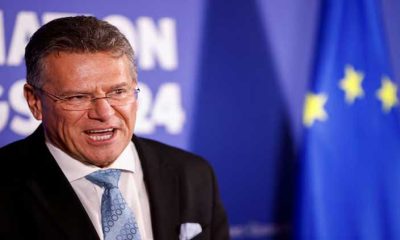Entertainment
Internet abuzz with similarities between Kohli, Ertugrul

Social media is abuzz with similarities between the looks of Virat Kohli and Turkish actor Cavit Çetin Günîr’s, who plays Doğan Bey in Diriliş: Ertuğrul.
Indian cricket icon Virat Kohli has once again become a trending topic on social media, but this time, it has nothing to do with his performances on the pitch. Instead, fans have been captivated by the uncanny resemblance between Kohli and Turkish actor Cavit Çetin Günîr, best known for portraying Doğan Bey in the historical drama Diriliş: Ertuğrul.
What started as a casual observation on Reddit soon snowballed into a viral discussion, with fans flooding social media platforms with memes and witty comparisons. The online buzz not only reignited interest in celebrity lookalikes but also underscored the vast global appeal of both Kohli and Diriliş: Ertuğrul.
The internet frenzy began when a Reddit user posted a screenshot of Günîr in character as Doğan Bey, accompanied by the caption: “Anushka Sharma’s husband’s TV show debut.” The post swiftly gained traction, amassing thousands of reactions and comments from amused fans.
One user shared their astonishment, stating, “Dont tell me he is NOT Virat but someone else. Damn!!!”.
Another quipped, “The first time I saw this Doğan Bey character in Ertuğrul, I genuinely thought, ‘What’s Kohli doing in a Turkish series?’ The resemblance is scary.”
Cavit Çetin Günîr rose to prominence through his role in Diriliş: Ertuğrul, a series created by Mehmet Bozdağ that aired between 2014 and 2019. The show, which chronicles the life of Ertuğrul Bey—the father of Osman I, the founder of the Ottoman Empire—became a global sensation, particularly in South Asia, where it garnered a massive fan base.
Entertainment
It’s all up to Allah – Salman Khan reacts to death threats

Salman Khan has reacted to the repeated death threats from gangster Lawrence Bishnoi.
The Bollywood megastar addressed the threats during a promotional event for his upcoming film Sikandar.
He said: “It’s all up to God, Allah. What is written is written. That’s all.”
Salman acknowledged the challenges created by the heightened security cover provided to him after the threats and the shooting near his apartment.
He added: “Sometimes, having to move around with so many people becomes a problem. “Galaxy, shoot, shoot Galaxy. No detours.”
Salman Khan has faced several attempts on his life. In April 2024, two men on a motorcycle fired several shots outside Galaxy Apartments in Bandra, where the actor lives.
The investigation later revealed that the shooting was aimed to intimidate the actor and was carried out on the instructions of gangster Lawrence Bishnoi.
The gangster, who is in prison in Gujarat, is enraged with Salman Khan over the 1998 blackbuck shooting case, in which he was accused.
The Bishnoi community holds blackbucks sacred. After the death of politician Baba Siddique in October 2024, the Bishnoi gang claimed responsibility and issued a warning to Salman.
Talking about filming Sikandar, Salman revealed filming had to take place with a heavy security presence.
Salman said that even though it was a tough shoot in terms of planning so many outdoor locations, it all went well.
Entertainment
Jayasuriya shares pic breaking fast with Muslim friends

Former Sri Lankan captain and cricket legend Sanath Jayasuriya observed a fast with his Muslim friends and shared an Iftar photo on social media.
A Buddhist by faith, Jayasuriya revealed that he has been fasting for a day every Ramazan since his school days to experience the spirit of the month alongside his Muslim friends, keeping this tradition alive for years.
Sharing a picture on X (formerly Twitter), he wrote:
“Fasted today with my Muslim friends—this is a small tradition I have followed since my school days during Ramadan.”
Fans from around the world praised the cricket legend for his gesture of inclusivity.
One user commented: “Wonderful, Sanath! It’s amazing how you’ve kept this beautiful tradition alive with your friends. Ramazan is a time for reflection and unity. As a Sinhalese who grew up in a Muslim village, I truly cherish those days.”
Jayasuriya’s gesture is a remarkable example of religious harmony and mutual respect, further earning him admiration from his fans.
Entertainment
Pakistan calls for more balanced model of globalisation

He emphasised the urgent need for an inclusive approach to globalization, one that benefits all nations, particularly the developing economies, said a press release issued here on Wednesday.
He made this call while attending a high-level session titled ‘Inclusive Globalization That Benefits All – Pathways and Actions’ at the Boao Forum for Asia Annual Conference 2025, held in Boao, Hainan Province, China.
Highlighting the growing inequalities within the global economic system, the Minister stated that while globalization has lifted over one billion people out of poverty, it remains fundamentally unequal, disproportionately benefiting developed economies while marginalizing the Global South.
He said the risks of rising protectionism, unilateralism, and trade wars are exacerbating global divisions, threatening to disrupt supply chains and weaken international cooperation.
For globalization to survive, it must be rebalanced to allow fairer participation for all nations, particularly those currently disadvantaged by restrictive trade rules and limited financial access, he said.
Senator Aurangzeb underscored that the time for rhetoric has passed, and decisive action is needed. Pakistan, like many developing nations, advocates for a more balanced model of globalization—one that promotes fair trade, sustainable growth, and equitable financial systems.
He said this model must be multilateral, innovation-driven, and inclusive, to foster development and prosperity across all regions.
One of the key challenges facing inclusive globalization, according to the Minister, is the widening wealth and opportunity gap.
The minister said that developed nations continue to gain from high-tech sectors, digital trade, and broad financial access, while developing nations are held back by high tariffs, restrictive investment policies, and limited infrastructure.
In response, Pakistan has consistently called for greater regional connectivity, fairer market access, and stronger multilateral cooperation, citing initiatives like the China-Pakistan Economic Corridor (CPEC) and the Special Investment Facilitation Council (SIFC) as steps in the right direction, he said.
The minister also called for a global coalition among developing nations to collectively demand fairer trade rules and greater representation in international financial institutions.
He said these alliances are necessary to combat the disproportionate tariffs and trade restrictions that hinder the integration of developing economies into global markets.
He pointed out that Pakistan’s textile and agricultural sectors—key drivers of its economy—face significant challenges due to protectionist policies in developed countries and non-tariff barriers that limit their access to Western markets.
Addressing the issue of financial inequality, Senator Aurangzeb stressed the need for debt relief and financial justice through restructuring sovereign debt mechanisms to prevent cyclical debt crises, which are impeding the economic growth of many emerging economies, including Pakistan.
He highlighted that global debt has soared past $100 trillion, with over 60 percent of low-income countries at risk of debt distress, diverting resources from critical social and economic investments.
He called for reforms in international financial institutions to offer developing economies greater financial flexibility and sustainable debt relief mechanisms.
The minister emphasized the transformative potential of technology in bridging global disparities.
He called on governments and international bodies to establish global AI and establish funds to support digital inclusion in developing economies.
While Pakistan has initiated the Digital Pakistan program, there is a need for stronger international collaboration in artificial intelligence (AI), fintech, and e-commerce to empower small and medium enterprises (SMEs) and drive inclusive economic participation in the country, he said.
About the climate change, the minister stressed, must be central to any discussion of globalization.
Developing nations contribute less than 10 percent of global carbon emissions yet suffer disproportionately from the consequences of climate disasters. Pakistan, despite contributing less than 1 percent of global carbon emissions, is one of the world’s most climate-vulnerable countries, he said.
Finance Minister said the devastating floods of 2022 inflicted $30 billion in damages and displaced 33 million people.
He said that Pakistan continues to advocate for urgent climate financing, green technology transfers, and fair global climate policies to support climate resilience in developing economies.
Senator Aurangzeb concluded his remarks by calling for a more sustainable approach to globalization. Developed nations, he urged, must fulfill their $100 billion annual climate finance commitments and prioritize renewable energy cooperation to help emerging markets transition to low-carbon economies. Furthermore, carbon-intensive trade restrictions that penalize export-dependent economies in the Global South must be reduced.
-
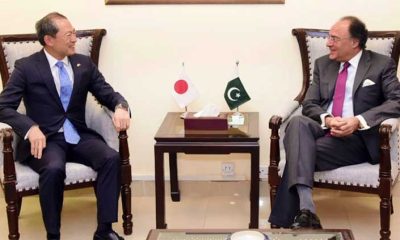
 Business2 months ago
Business2 months agoFinance Minister Aurangzeb discusses bilateral cooperation with Japanese envoy
-

 Entertainment3 months ago
Entertainment3 months agoBlake Lively accuses ‘It Ends With Us’ director Justin Baldoni of harassment and smear campaign
-

 Sports3 months ago
Sports3 months agoSouthampton set to sign Juric as new manager
-
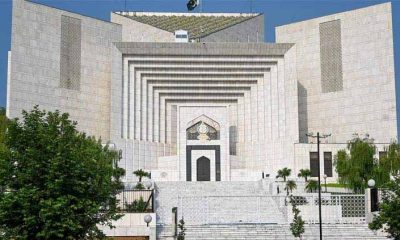
 pakistan2 months ago
pakistan2 months agoSC additional registrar submits response to show-cause notice in contempt case
-
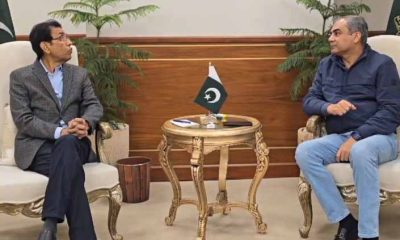
 pakistan3 months ago
pakistan3 months agoKhalid Maqbool calls on Interior Minister Naqvi to discuss overall political situation
-

 Sports3 months ago
Sports3 months agoInter reach Coppa Italia quarter-finals with 2-0 win over Udinese
-
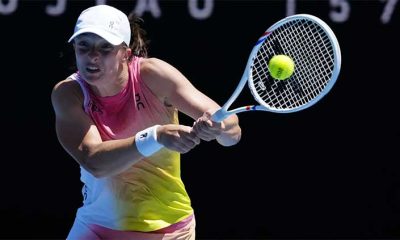
 Sports2 months ago
Sports2 months agoSwiatek powers into Raducanu clash as Fritz fires Melbourne warning
-

 pakistan3 months ago
pakistan3 months agoPTCL confirms cable damage, resolves to swiftly address public concerns











